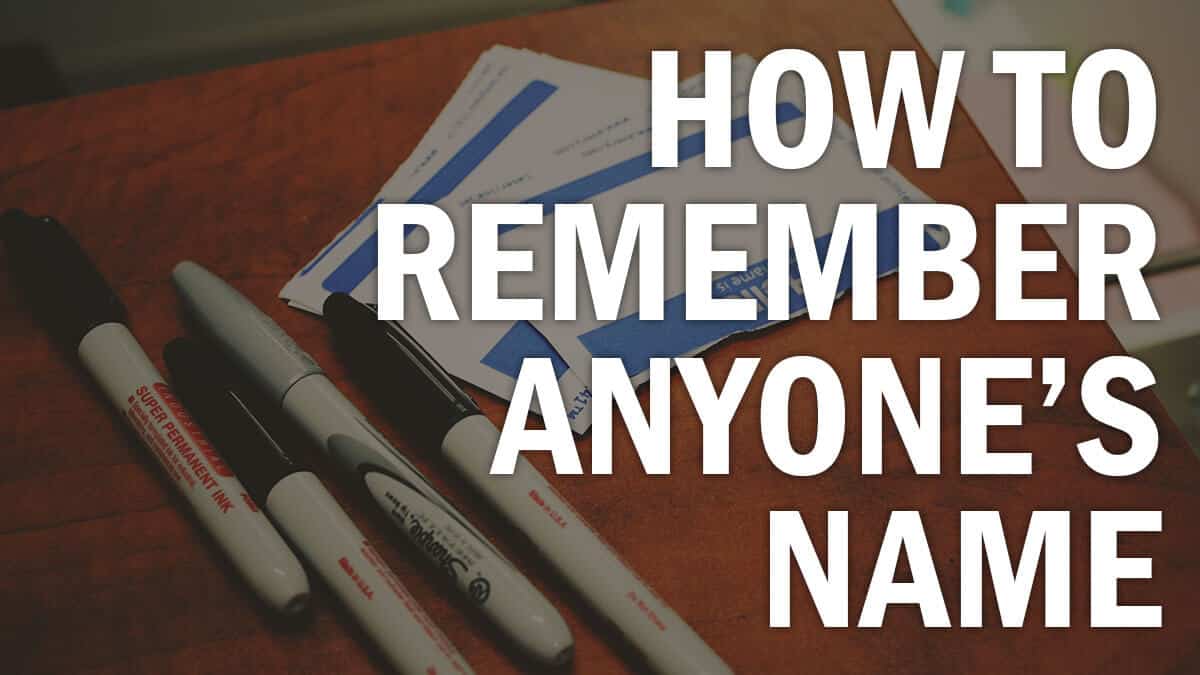It seems like some people are just naturally good at remembering names, while the rest of us are doomed to be bad at them.
As with many things in life, however, you have the power to change this. With practice, you can get better at remembering names. Before you know it, people will think of you as the person who’s “just good with names.”
But how do you get better at remembering names? And what makes them so difficult to remember in the first place? Read on to find out.
Why You Should Get Better at Remembering Names
“A person’s name is, to that person, the sweetest, most important sound in any language.”
– Dale Carnegie
It’s tempting to accept that you’re bad with names and give up hope of getting better at them. After all, most people are bad at remembering names — why should you bother being different?
However, there’s a very good reason to get better at remembering names. While names are arbitrary information that doesn’t mean much to our brains, a person’s name is not arbitrary to them.
Your name is the centerpiece of your identity. So if you can remember and use a person’s name, you’ll make a great impression. Ultimately, this will help you build stronger relationships.
After all, there’s nothing more awkward than meeting someone multiple times, building a relationship with them, and still not knowing their name. Making the effort to learn someone’s name shows that you care.
Why Are Names Hard to Remember?
If names are so important, why are they so hard to remember?
Names are difficult to remember because they are arbitrary information. And humans are notoriously terrible at remembering arbitrary information. This is true whether we’re talking about telephone numbers, historical dates, or someone’s name.
Arbitrary information is difficult to remember because there’s not a lot to connect it to in your brain. In contrast, an object such as a “coffee cup” brings up all kinds of images. A coffee cup might make you think of your morning ritual, the brand of coffee you drink, or sharing a conversation with friends.
Names, for the most part, don’t conjure up the same vivid imagery. Sure, the name of your parents, siblings, or partner might bring up many memories and images. But for the most part, names don’t give our brains a lot to latch onto (especially when we meet someone for the first time).
This isn’t just conjecture, by the way. There’s plenty of scientific research that shows why we have trouble remembering names.
For instance, Gillian Cohen of the Human Cognition Laboratory conducted two experiments in which subjects were shown 12 pictures of unfamiliar faces along with information about each person. The experiments found that people were better at matching a face to an occupation than a name.
This demonstrates that it’s easier to recall meaningful information (such as a person’s occupation) than arbitrary information (such as a person’s name).
How to Remember Names: 5 Techniques That Work
So now we know why names are difficult to remember. But what can we do to improve our recall of people’s names?
Here are five techniques that will make remembering names a lot easier:
1. Recognize That Names Are Difficult to Remember
The first step to being better with names is respecting how difficult they are to remember. This might seem counterproductive. But much of the trouble people have with names comes from our tendency to assume we can easily remember arbitrary information.
To demonstrate this, let me take you back to my high school physics class. Many times in this class, I remember watching my teacher work out problems on the board and thinking how easy they seemed.
So easy, in fact, that I didn’t bother to take good notes on how to solve the problem. When I would do the class’s homework later that night, however, I’d quickly realize that the problems were not as easy as I’d assumed and regret not taking notes (always take notes).
It’s the same when you learn someone’s name. You meet them, hear their name, and assume it will be easy to remember — you just heard it, after all. But inevitably, something else will pop into your mind and distract you. Before you know it, you have no idea what the person’s name is.
Don’t make this mistake. Recognize that names are difficult to remember, and you’ll naturally put more effort into remembering them.
2. Use the Person’s Name in Conversation
Accepting that names are difficult is an important first step, but you need to do more than that if you want to improve your recall. One of the most powerful techniques for remembering someone’s name is to use it in conversation after you meet them.
The simplest way to do this is to change your response when you meet someone. Instead of saying, Nice to meet you, you should say, Nice to meet you, [person’s name]. It’s a subtle change, but the effect on your brain is powerful.
When you say the person’s name out loud, you force your brain to interact with the information in a new way. Instead of just hearing the name, you’re now engaging all the parts of your brain (and body) required to speak it.
This results in new neural pathways to the person’s name, which in turn improves your recall.
To make this technique even more effective, use the person’s name more than once in the conversation.
This can take some practice to seem natural; using someone’s name too much can come across as creepy. But if you do it right, you won’t just increase your chances of remembering the person’s name — you’ll also give that person the great feeling that comes from hearing their name (remember what Dale Carnegie said, above).
If you’re not sure when else to use someone’s name in a conversation, at least use it when you part ways. Don’t just say, It was nice to meet you. Instead, say, It was nice to meet you, [person’s name]. This is also a good opportunity to ask the person to remind you of their name if you’ve forgotten.
3. Practice Retrieving the Person’s Name
Using someone’s name will help embed it into your memory, but it’s not foolproof. To be extra sure you don’t forget, mentally quiz yourself every so often on what the person’s name is.
We recommend doing this a few different times. First, quiz yourself at least once during the conversation with the person. Be sure you don’t zone out and lose the thread of the conversation, of course.
Once the conversation is over, quiz yourself again. Optionally, write down the person’s name in your phone along with a note about who they are and how you met.
Finally, quiz yourself on the name at the end of the day. One of the best ways to be sure you do this is to keep a journal and write down the names of anyone you met.
The more you can practice retrieving the person’s name, the more likely you are to remember it.
4. Use Mnemonic Devices
Our final tip for remembering names is to use mnemonic devices. Briefly, mnemonics are “memory aids” in which you link arbitrary, difficult to remember information (names, telephone numbers, etc.) to vivid, easy to remember information.
A mnemonic can be anything from an acronym to a rhyme to a ridiculous story.
For instance, if you met someone named “Avery,” you could think of a word that rhymes with their name (let’s say “bravery”).
Then, you could make up a quick mental story involving Avery displaying some act of bravery (fighting a dragon, for instance).
It seems silly, but that’s exactly the point: linking someone’s name to a vivid, silly image turns arbitrary information into something memorable.
5. If You Forget Someone’s Name, Admit It
Even with all the memory techniques in the world, there will come a time when you forget someone’s name. When this happens, the best approach is to admit it and ask the person to tell you their name.
Sure, you could hope that their name will come up in conversation, such as when another person enters the room and greets them. Or, you could wait until the two of you exchange contact information (at which point you can ask them to spell their name).
However, I don’t recommend these techniques as a rule. While you might get lucky, you also run the risk of awkwardly having to introduce the person to someone else…only to realize you don’t know their name. It’s better to be honest and just ask, “Can you remind me of your name?”
Not only does this save you embarrassment, but it also shows that you care enough about the person to make a point of knowing their name.
Remembering Names Is Worth the Effort
I know remembering names may seem like a lot of work, but I assure you that the effort is worth it. You know the warm feeling you get when someone says your name, so you can imagine how great it will make other people feel when you can say theirs.
And once you make remembering names a habit, it will get easier. If you’re looking to build the habit of remembering names (or any other habit), I recommend checking out our latest course on building habits that last:
Building habits isn’t just about discipline; there are real-world steps you can take to set yourself up for success! In this course, you'll learn how to set realistic goals, handle failure without giving up, and get going on the habits you want in your life.
Image Credits: markers on table



